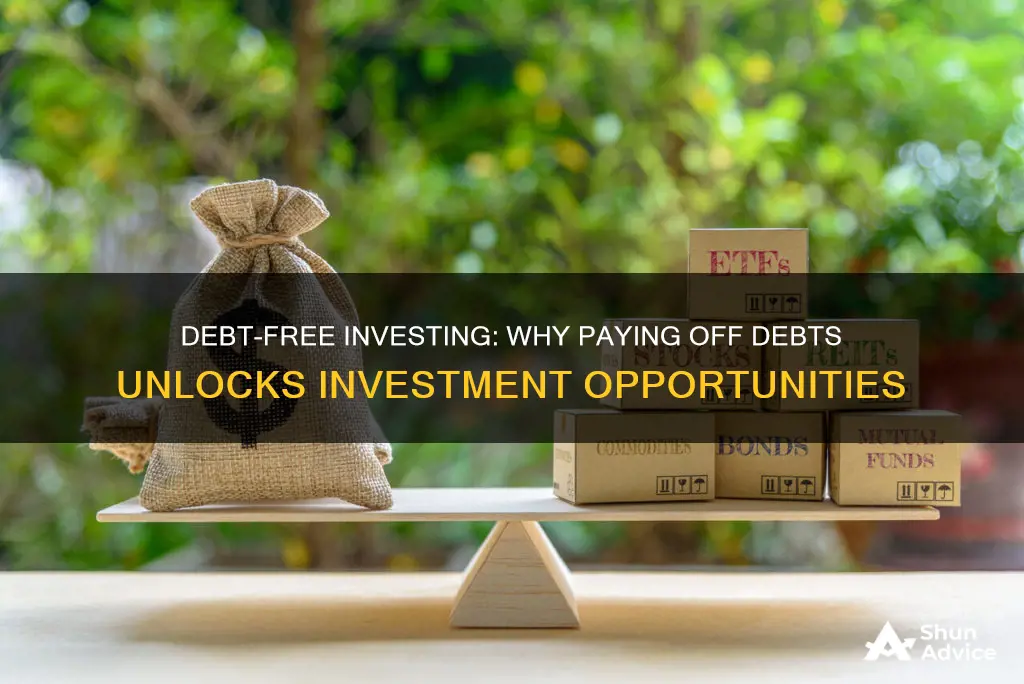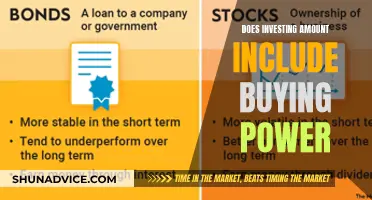
Paying off debts before investing is important because it allows individuals to save money on interest charges, improve their credit score, and reduce the mental and emotional burden associated with debt. High-interest credit card debt, in particular, can be costly and challenging to eliminate, with interest rates hovering around 20%. By focusing on paying off such debt first, individuals can save hundreds or thousands of dollars in interest. Additionally, paying off debt can improve one's credit score, which is crucial when applying for loans or financing large purchases. Furthermore, the weight of debt can take a toll on one's psychological well-being, and paying it off can provide a sense of relief and improve overall mental health. Therefore, it is generally recommended to prioritise paying off debt, especially high-interest debt, before investing.
| Characteristics | Values |
|---|---|
| Interest rate on debt | 6% or greater |
| Return on investment | Lower than interest rate on debt |
| Credit score | Low |
| Risk tolerance | Low |
| Peace of mind | High |
| Retirement timeline | Near |
| Debt amount | High |
What You'll Learn

Investing in stocks, mutual funds or other investments might outweigh interest paid on debt
Investing in Stocks, Mutual Funds, or Other Investments vs. Paying Off Debt
When deciding whether to invest or pay off debt, it's important to consider your financial situation, the interest rates on your debts, and your financial goals. Investing in stocks, mutual funds, or other vehicles can offer higher returns than paying off low-interest debt, but it's a strategy that comes with risks. Here are some key points to consider:
Understanding the Basics of Investing and Debt Repayment:
- Investing is a way to set aside money for the future, with the potential for growth over time. It often involves risk, especially in volatile markets.
- Debt, on the other hand, accumulates interest over time, increasing what you owe. Credit card debt, in particular, can be costly, with high-interest rates.
When Investing May Outweigh Paying Off Debt:
- If you can earn a higher return on your investments than the interest you're paying on your debts, investing may be a better option. For example, if you have a mortgage with a 5% interest rate and can invest in a stock market index fund returning 10% annually, investing could be more advantageous.
- Your risk tolerance is also a factor. If you're comfortable with market fluctuations and potential losses, investing may be suitable.
- Additionally, consider your retirement timeline. If you're closer to retirement, balancing debt repayment and investing is crucial. You don't want to bring high-interest debt into retirement, but you also need to ensure you have adequate retirement savings.
When Paying Off Debt May Be a Better Option:
- If you have high-interest debt, especially credit card debt, focusing on repayment first is often recommended. Credit card interest rates can be significantly higher than what you'd earn through investments.
- Your credit score is another factor. Paying off debt, especially credit card debt, can improve your credit utilization ratio and increase your credit score. This can impact your ability to borrow money, rent an apartment, or even influence employment opportunities.
- Peace of mind is also important. If your debt is causing you stress and affecting your well-being, paying it off can provide relief and improve your quality of life.
- It is possible to balance both investing and debt repayment. Creating an emergency fund, taking advantage of your company's retirement plan matches, and finding ways to increase your income can help you achieve this balance.
- Prioritizing debt with higher interest rates, such as credit card debt, while making minimum payments on other debts, can also help you make progress in both areas.
Investing in Yourself: Why the Fear?
You may want to see also

Paying off debt improves your credit score
Paying off debt can improve your credit score, which is important for several reasons. Firstly, a good credit score can make it easier to borrow money in the future, such as taking out a mortgage or a car loan. A low credit score, on the other hand, may result in higher interest rates on loans or even make it difficult to obtain a loan at all.
Your credit score can also impact other areas of your life, such as insurance premiums, renting an apartment, and even job applications. Lenders use your credit score to assess your risk as a borrower, with a low score indicating a higher risk. This can lead to higher interest rates and more challenging loan terms.
Additionally, by paying off debt, you can reduce your credit utilisation ratio, which is a significant factor in calculating your credit score. This ratio compares the amount of credit you are using to the total credit available to you. For example, if you have a credit card with a $1,000 limit and you've spent $500, your credit utilisation ratio is 50%. A lower ratio, ideally below 30%, indicates that you are managing your credit well and can improve your credit score.
Furthermore, paying off debt can demonstrate financial responsibility and stability, which are favourable traits when applying for loans or other financial products. It shows that you are capable of managing your finances effectively and can handle the commitment of regular payments.
When deciding between paying off debt and investing, it's important to consider the interest rates on your debt and weigh them against the potential returns on your investments. High-interest debt, especially credit card debt, can accumulate quickly and become increasingly difficult to repay. By prioritising the repayment of high-interest debt, you can improve your credit score and reduce the burden of debt in the long run.
The Debt Dilemma: Navigating the Path to Financial Freedom
You may want to see also

The emotional burden of debt can negatively impact your life
Debt can have a significant emotional burden, which can negatively impact your life in several ways. Here are some of the key ways in which the emotional burden of debt can affect you:
Stress, Anxiety and Depression
The weight of debt can keep you awake at night, causing stress, anxiety and even depression. The stress of debt can manifest in various ways, such as lack of sleep, loss of focus and constant worry. This can lead to a decline in your overall quality of life and well-being.
Anger and Resentment
Debt can cause anger, not only towards yourself and the decisions that led to your debt but also towards others, such as your partner, employers or creditors. This anger can ruin relationships and lead to negative physiological effects, including migraines and heart disease.
Low Self-Esteem and Hopelessness
Debt can make you feel overwhelmed and hopeless, leading to low self-esteem and, in some severe cases, suicidal thoughts. It can be challenging to make decisions and take risks when burdened by debt, as the fear of missing payments or never becoming debt-free looms over you.
Denial
It is common to be in denial about your debt, ignoring bills and overdue notices. However, this can lead to late charges and interest rate increases, causing your debt to grow even larger.
Relationship Issues
Arguments about money are a common cause of divorce, second only to infidelity. High levels of debt and poor communication about financial issues can lead to stress and arguments within a marriage or partnership.
Physical Health Issues
The emotional burden of debt can also impact your physical health. Stress caused by debt can affect your blood pressure, heart rate, immune system, mood, memory and weight.
Fear and Shame
Debt can evoke feelings of fear and shame, especially if you are struggling to make payments. You may fear eviction, foreclosure, bankruptcy or losing your utilities or job. Shame and embarrassment about your financial situation may lead you to hide your debt from family and friends, further isolating you.
In conclusion, while debt can provide a financial burden, it is important to acknowledge the emotional weight it carries as well. Addressing the emotional burden of debt and seeking support can be crucial steps towards improving your overall well-being and financial freedom.
Rust Belt: Why Invest Elsewhere?
You may want to see also

Investing early benefits from compounding interest
Investing early has multiple benefits, and one of the most important is the power of compounding interest. Compounding interest is a way to accelerate wealth creation by earning interest on interest. The earlier you start, the more time your money has to grow, and the more wealth you will generate in the future.
Compounding interest is calculated on both the initial principal and all the previously accumulated interest. The higher the number of compounding periods, the greater the compound interest growth will be. For example, a $100,000 deposit receiving 5% simple annual interest would earn $50,000 in total interest over 10 years. However, if that same deposit had a monthly compound interest rate of 5%, the interest would add up to about $64,700.
The number of compounding periods is just as important as the interest rate. The more frequently interest is compounded, the more beneficial it is to the investor. For example, if you start saving $100 a month at age 20, earning an average of 4% annually, compounded monthly, across 40 years, you would earn $151,550 by age 65. However, if your twin doesn't begin investing until age 50, investing $5,000 initially and then $500 monthly for 15 years at the same average monthly compounded return, by age 65, they would have only earned $132,147. Despite investing more than double the principal amount, your twin would end up with $183,000 less at age 65.
Starting early with investing also allows you to take more risks. Younger people with many productive earning years ahead can afford to take more risks with their investments. A longer investment time horizon enables good years in the market to balance out the bad ones, allowing market returns to come closer to their long-term averages.
Additionally, investing early helps you develop disciplined spending habits. You will become accustomed to paying yourself first before paying others. For example, you will prioritise contributing to your retirement plans or IRAs before spending your money on non-essential items.
Finally, investing early gives you valuable experience. Since investing has a protracted learning curve, starting early gives you years to study the market and refine your strategies to avoid investment pitfalls. The experience gained from investing early will play a significant part in your future investment success.
Smart Ways to Invest $1,000 Right Now
You may want to see also

Investing in a 401(k) can lower your taxable income
Investing in a 401(k) can be a powerful resource for building a secure retirement. It can also help lower your taxable income. Here's how:
Pre-Tax Contributions
Contributions to a traditional 401(k) are typically made on a pre-tax basis. This means that your contributions are deducted from your paycheck before taxes are taken out. As a result, your taxable income is lowered, and you end up paying fewer taxes overall. For example, if you usually pay $10,000 in taxes annually on a $40,000 salary, contributing $2,000 to your 401(k) in a year would lower your taxable income to $38,000. At the same 25% tax rate, you would only owe $9,500 in taxes, saving you $500.
Tax-Deferred Growth
With a traditional 401(k), you don't pay taxes on the interest or investment earnings on your contributions until you withdraw the money during retirement. This allows your savings to grow tax-free until you need it.
Employer Matching
Many employers offer to match employee contributions to a certain percentage, providing an additional source of tax-free retirement savings. This is essentially "free money" that can boost your retirement nest egg.
Compound Interest
The earlier you start saving in a 401(k), the more time your money has to grow, and the more you benefit from compound interest. Compound interest is when you earn interest on top of the interest previously accrued, allowing your savings to grow exponentially over time.
Lower Tax Bracket in Retirement
When you do withdraw funds from your 401(k) during retirement, you will likely be in a lower tax bracket since your income will probably be lower than during your working years. This means you'll pay a lower tax rate on your withdrawals than you would have while working.
While investing in a 401(k) can provide tax advantages, it's important to remember that there are penalties for early withdrawals. Generally, you should avoid withdrawing from your 401(k) before the age of 59 1/2 to avoid a 10% early withdrawal penalty.
Litecoin: Worth Your Investment?
You may want to see also
Frequently asked questions
Paying off debts with high-interest rates, such as credit card debt, saves you more money in the long run.
Interest rates above 6% are generally considered high.
Compare the interest rate on your debt with the return you expect to earn on your investments, and choose the option with the higher percentage.
Reducing debt can improve your credit score, which is important if you want to buy a home or finance a vehicle. It can also give you peace of mind and improve your psychological well-being.
Yes, if you have an employer who matches your 401(k) contributions, it is generally recommended to take advantage of this benefit before paying off low-interest debt. Additionally, if you are carrying debt with a low-interest rate, you may be able to earn more by investing your money instead.







